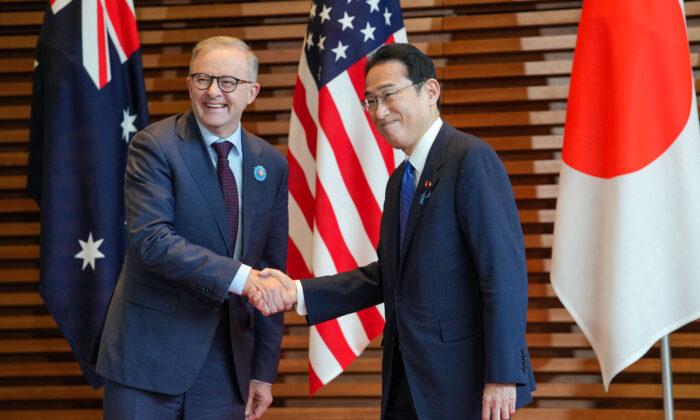Australian military personnel could face the death penalty under a new military agreement struck between Japan and Australia, with the Australian Law Council calling on the federal government to withhold making the treaty binding until safeguards are enshrined.
According to the Japanese Ministry of Defence, it will “facilitate the implementation of cooperative activities between the defence forces of the two countries and further promote bilateral security and defence cooperation.
“There is no explicit provision in the reciprocal access agreement to prevent the imposition of the death penalty in situations where Japanese authorities have in custody or otherwise do not require the assistance of Australian authorities to arrest and successfully prosecute under Japan’s criminal jurisdiction a member of the Australian Defence Force or its civilian component,” Liveris said.
In an email to The Epoch Times, Liveris emphasized that the Law Council believed that while the risk may be difficult to quantify, the federal government should not take “a near enough is good enough approach on this important global issue.”
“Australia’s commitment to pursuing global abolition of the death penalty is strong and bipartisan, as outlined in its 2018 Strategy for Abolition of the Death Penalty, and this should inform bilateral agreements such as this one with Japan,” he said.
He also noted that the Council urged the committee not to approach this question on the basis of a risk assessment or an analysis of the likelihood that a member of the visiting force or the civilian component may be executed or may commit a crime that exposes them to the death penalty.
Instead, the Council advised them to base their decision on the “need to uphold and give primacy to Australia’s strategy, which is absolute in its terms of opposing the death penalty, and to protect our serving personnel.”
Liveris said the Council would like to see the federal government withhold its ratification of the RAA until they have in the written agreement that no member of Australia’s visiting forces, including the civilian component, be subject to the death penalty.
“This is a very narrow carve-out from the application of the domestic law of Japan onto the visiting force and the civilian component, and they are very easy words to insert,” he said.
According to the Law Council director’s testimony to the parliamentary inquiry under the RAA, if a criminal offence occurs in Japan’s jurisdiction, Australia is obliged under article XXI(5)(a) of the treaty “to assist in the arrest and handing-over of a member of the Australian Defence Force or its civilian component.”
The only exception applies to situations that accord with an annex relating to the Treaty’s article XXI, where it considers that such assistance would be inconsistent with its international obligations.
Likelihood of Australians Facing Death Penalty ‘Vanishingly Small’
However, a representative of the Department of Defence has told the inquiry that the risk of Australian civilians or military personnel facing the death penalty is “vanishingly small.”“It’s not applied, for example, where there is a car accident that you have caused, with multiple fatalities, but not intentionally. It is exceedingly rarely applied even for intentional crimes that don’t involve particularly heinous attacks on people,” Jefferies said. “When you do see it applied, it is applied in particularly extreme circumstances of crimes. The possibility that Australian Defence Force personnel would be involved in such criminal activity, we think, is vanishingly small.”
Meanwhile, Air Commodore Patrick Keane noted that the agreement was not dissimilar to other bilateral treaties Australians face around the world.
“That kind of division of jurisdiction is a pretty common feature of agreements of this kind. It’s one of the issues that are commonly dealt with in any kind of visiting forces agreement for one country in the presence of the other,” Keane said.
Japanese Executions Are Surrounded in Mystery, Says Amnesty International
Japan last carried out an execution in July, with the government-ordered hanging of Tomohiro Kato, a man who was convicted of stabbing seven people to death in 2008.“Prisoners are typically given only a few hours notice and some given no warning at all before their death sentences are carried out,” Amnesty International said, noting that prisoners’ families are usually informed about the execution after it has taken place.





Friends Read Free